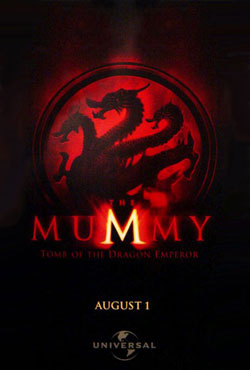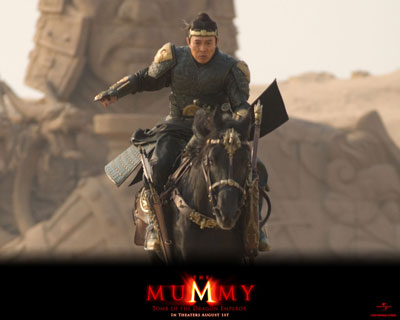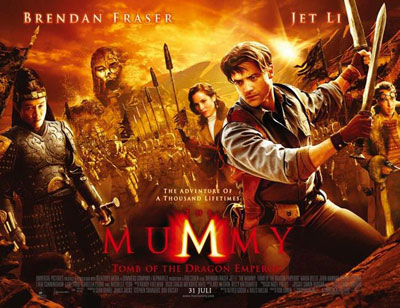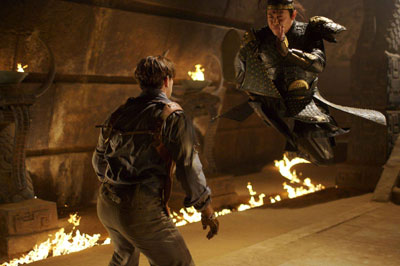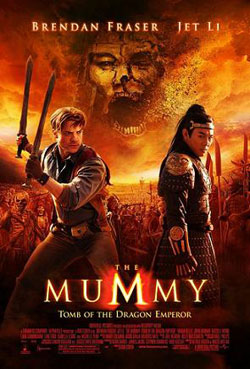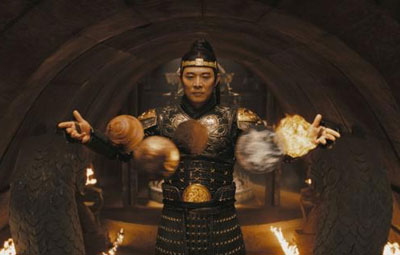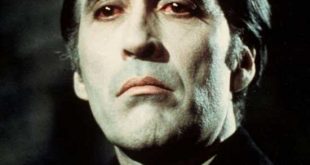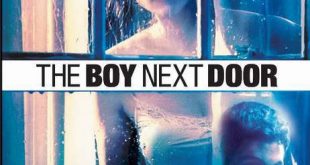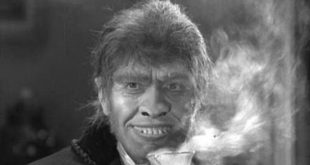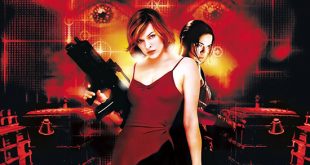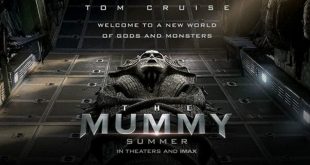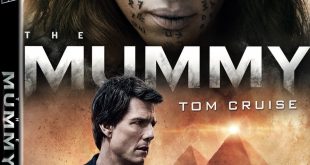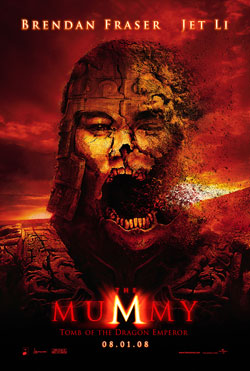 Former wunderkind producer and executive Rob Cohen burst onto the directing scene with his biopic Dragon: The Bruce Lee Story in 1993. Since that time, he has become one of the renowned action directors in Hollywood with films including Dragonheart, The Fast and the Furious, and XxX. Last year, he undertook his biggest project to date, The Mummy: Tomb of the Dragon Emperor, the second sequel in Stephen Sommers’ mega-hit from 1999, The Mummy, an update of the 1932 Universal classic about the O’Connell family tracking a series of resurrected warriors in the mid-20th century. New to the franchise is Jet Li, who stars as Emperor Han alongside regular Brendan Fraser as Rick O’Connell and his wife Eve, this time played by Maria Bello, and Michelle Yeoh as a fellow adventurer. In this exclusive interview, conducted just days before the film’s original August 2008 release date, Cohen waxes on all things Mummy and the machinations of his skyrocketing directing career.
Former wunderkind producer and executive Rob Cohen burst onto the directing scene with his biopic Dragon: The Bruce Lee Story in 1993. Since that time, he has become one of the renowned action directors in Hollywood with films including Dragonheart, The Fast and the Furious, and XxX. Last year, he undertook his biggest project to date, The Mummy: Tomb of the Dragon Emperor, the second sequel in Stephen Sommers’ mega-hit from 1999, The Mummy, an update of the 1932 Universal classic about the O’Connell family tracking a series of resurrected warriors in the mid-20th century. New to the franchise is Jet Li, who stars as Emperor Han alongside regular Brendan Fraser as Rick O’Connell and his wife Eve, this time played by Maria Bello, and Michelle Yeoh as a fellow adventurer. In this exclusive interview, conducted just days before the film’s original August 2008 release date, Cohen waxes on all things Mummy and the machinations of his skyrocketing directing career.
Q: Regarding The Mummy: Tomb of the Dragon Emperor, why did you choose to direct a sequel, which I don’t think you’ve done to date?
ROB COHEN: I’ve never done a sequel to my own movies because there always seems to be new and better ideas out there than to do the same thing you just did. So when they said Mummy 3, I went, “What?” And then my agent said, “I just want you to know before you pass on it without reading it, that it all takes place in your favorite country – China. The Terra Cotta Army of Zi Yuan are the mummies.” And the script by Al Gough and Miles Millar was really good and funny. It wasn’t quite what I wanted to do, but it was a foundation that we could build on because it had the story and it had the great idea about the Terra Cotta Army. As the mummies and the thememummy as one of the emperors of China have come back for conquering the world – I just wanted to do, always, since Dragon, a movie about China.
Q: What was your initial idea as to your directorial approach to this film?
ROB COHEN: I always thought that the way to approach China was to do a fantasy. I had been preparing The Eighth Voyage of Sinbad at Sony, but when Stealth didn’t work, they cancelled it. When I read The Mummy, I thought all the imagination, the work and research that I’d done on Sinbad could be used here and I was very excited. And I met with Stephen and Bob Ducsay and producers Sean Daniel and Jim Jacks and I had a really wonderful meeting with them. I could be very direct; I said what I thought and said, “If you can get with these ideas, I’ll do it, and if you can’t, then I’m the wrong guy.” And they loved the ideas and credit to Stephen as he had a very good sense of detachment, and he was excited about the franchise having a new energy and a new approach. When you see it, it’s more a movie of mine than one would suspect because it‘s the third one in a franchise. It has 1,000 3D visual effects that are mind boggling, and it even has an avalanche sequence. So it has battles and three-headed dragons, and yeti, and chases, and romance, and humor. It’s a very detailed, very epic film, having a big fantasy that draws upon a lot of things from Chinese culture that I love.
Q: Jurassic Park had some 50 visual effects shots, so with 1000, you’re talking about a huge visual effects film. How do you stay on top of 1,000 visual effects shots?
ROB COHEN: Every day! Every shot, reviewing, talking to the digital artists, the lighting, the details, what’s important, the animation, what is the story point? But it’s all story, story, story –to make sure the visual effects are not just visual effects, but they’re a character in the film. The yetis have come to save the O’Connells in Tibet, or the three-headed dragon that the emperor becomes, or any other tricks that Jet Li, who plays the emperor, does as the mummy. And he has control of the five elements in Chinese mythology of fire, water, earth, wood, and metal.
Q: The film looks to be one of the most visually enriched in the series to date.
ROB COHEN: Simon Duggan the DP, and Nigel Phelps the production designer, and Sanja Hays the costume designer: we all worked together to make this a really beautiful movie to watch, not just exciting, but visually beautiful. I’m watching it right now from my little soundproof booth, but I looked at the colors and the feeling of Shanghai 1947 and the deserts, and it’s just a very rich palate in a very intricate tapestry. Simon, no matter what I threw at him, he was unflappable and the film looked gorgeous and he was open and receptive to what I wanted to do. He had a lot of great ideas of what he wanted to do, and we really got along.
Q: The sets in this film are among the largest practical sets that have been built in a recent blockbuster film because of all of the reliance on digital set extensions.
ROB COHEN: Nigel pulled off quite the miracle because I wanted this thing to be big. I didn’t want it to be “build a column and then wrap the whole world with green screen and then you can extend it.” I always know as a viewer that that’s what they did. And it doesn’t make me feel like they worked as hard for me as a viewer as they should. Also, I like the actors that come on set and have their minds blown and immediately be in the place they’re supposed to be. And you can’t do that with green screen. So, I spent more money on the budget with sets than maybe you could have done another way but when you’re watching the movie, you have no doubt you’re racing down the street in Shanghai in 1947. You have no doubt you’re in a cave above Shangri-La, in the Himalayas or any of the other sets that we built. There’s a skill to it and a reality to it that helps anchor the fantasy, and that’s what I was trying to do. If you have all of these fantastic elements and you don’t keep a string to the balloon, the balloon just flies away. This way, you always have some tangible reality to counterbalance the wildness of the fantasy.
Q: What informed your decision to work for the first time with crew members who are new to your films?
ROB COHEN: I think that when you work with new people, you have collaborators that’ll be very ruthlessly honest with you. You don’t have to agree with them, but at least you’re getting the benefit of another viewpoint. Films are so large and so complicated that you can have a vision, but you always have to keep yourself open so that the simple idea or the interesting detail comes and you’re receptive, you’re open. Also the fact that your openness encourages everyone to do their best. If you have a death grip on the movie, then what is the incentive for anyone to do anything more than what you tell them to do? So then you’ve got to tell them everything because they’re afraid to make a move without your intakes.
Q: Dose that apply to Sanja Hays as your costume designer?
ROB COHEN: Yes, I try to set parameters within which everyone can create, so I’ll have meetings with Sanja and I’ll say, “I want to do a kung-fu fight with Maria Bello in an evening dress,” so she has to be able to work in the evening dress and be able to do stunts in the evening dress. So there’s going to be no stunt pads and stuff to protect her. They have to make it so it can work so we don’t see up her dress when she does flips or athletic moves. And I’d like her to look elegant, and we talk about what colors the dress could be. And then Sanja goes away and designs this wonderful dress she did for Maria that I’m referring to. And that’s the same with Jet Li’s armor and all the 200 BC costumes and armor and the 1946-1947 costumes. You give them the parameters of the intent and what’s going to happen and how you see it, and then you’ll let them give you the answer.
Q: When you’re making your own movie within The Mummy franchise, were you strictly sticking within the world of the Stephen Sommers films?
ROB COHEN: Well, I was really sticking with the world of my imagination. I can’t say that The Mummy: Tomb of the Dragon Emperor has very much to do with the Boris Karloff version and the world of Steve is a different world than the one I inhabit. And the beauty of what I got here is he gave me a franchise with a great name, an actor in Brendan that had great affinity for the character that he created, Rick O’Connell, and then let it go. So the tone of China is very different than the tone of Egypt. We really shot all over China. You feel this solid reality and wonder of China. And Stephen would want me to be in his world because that’s how franchises keep moving; they have to go to another world and they must have another sensibility. But you keep up with the times and to make the audience feel like they are going to get enough connection to what was called The Mummy but also something new.
Q: Regarding the marketing of a film, some directors have said to the effect of “they don’t tell me how to make the movie and I don’t tell them how to sell it.” Where do you stand?
ROB COHEN: Well, I’m not like that. I’m like this: I have a point of view on the movie. I was a producer and I still have those skills in play. We had many battles with the marketing department on this one, all honorable, and I would like to think that the producers and I won our point of view. But I trust the marketing department so much that I showed them the cut of the film long before the creative part of the studio ever saw it. You have to not be arrogant and say you know better, and you have to not thwart their creativity because they are creative people and they have a very different point-of-view than a filmmaker on how to get people in the seats. So, it’s a balance, like everything in life, between keeping your focus and being overly constricting. So, if you want to be a filmmaker, you have to realize what a long arbiter a movie is cut of and shaped on, how many phases there are to it, and how long you have to be totally focused on your story and the movie itself, and how it seemed one way but making a film is really trench warfare. So, get your spade and start digging!
 Horror News | HNN Official Site | Horror Movies,Trailers, Reviews
Horror News | HNN Official Site | Horror Movies,Trailers, Reviews
